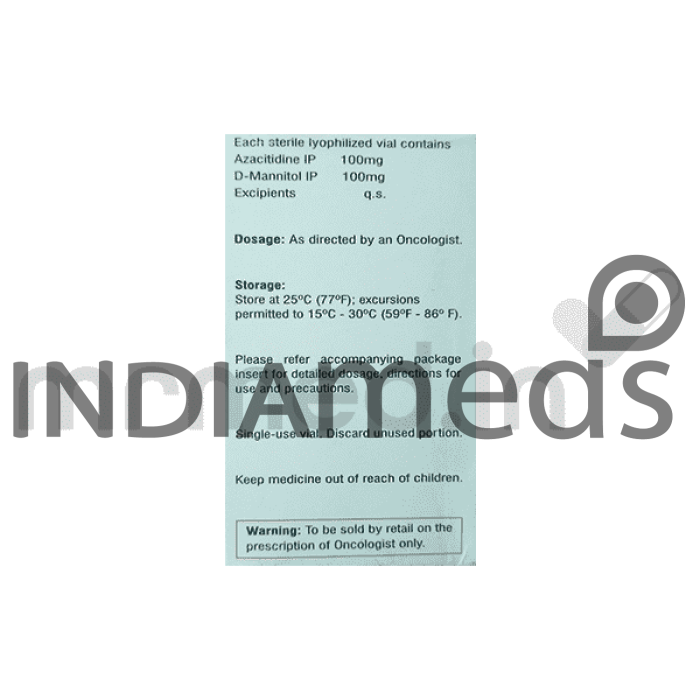Citaza100mg Injection for injection is used for treating adults with Myelodysplastic syndrome (MDS) and Acute myeloid leukemia (AML) if they are considered ineligible for stem cell transplant. In Myelodysplastic Syndrome, the bone marrow does not produce healthy blood cells due to its lack of function. Acute Myeloid Leukemia is a type of bone marrow cancer caused by the release of incompletely formed blood cells into the bloodstream.
Therapeutic Effects of Citaza 100mg Injection
Pregnancy
Citaza 100mg Injection could be harmful to the unborn fetus. Inform your physician if you are pregnant or planning to get pregnant.
Breast Feeding
Breastfeeding is not intended for patients on Citaza 100mg Injection therapy. Consult your physician for advice.
Lungs
It is not known whether it is safe to administer Citaza 100mg Injection in lung failure patients. Please consult your doctor.
Liver
Inform your physician if you have been told that you have a tumor in the liver cells.
Alcohol
It is not known whether it is safe to consume alcohol with Citaza 100mg Injection. Please consult your doctor.
Driving
It is unsafe to drive after taking this injection as it causes dizziness and patients lack concentration and alertness. So, avoid driving and handling heavy machinery after taking Citaza 100 mg injection.
Serious:
- Unexpected bleeding, with blood in stool and urine
- Fever
- Pneumonia is characterized by chest pain or breathlessness.
- Allergic reaction with symptoms of swelling of lips, itching, or rashes.
- Seizures, loss of consciousness, severe headache, or bleeding in the brain
- Frequent urination with pain or burning sensation
Common:
- Disturbances in the blood count (RBC, WBC, Platelets)
- Nausea, vomiting, diarrhea
- Constipation
- Tiredness
- Skin reactions like redness and pain at the site of injection
- Decreased appetite
- Dizziness
- Pain in extremities
- Joint pain
- Stomach pain
- Headache
- Sore nose and throat
- Rashes and bruising
Take Citaza 100mg Injection only under the supervision of the physician. Doctors will decide the dose based on the patient's height, weight, and general condition. Citaza 100mg Injection is administered under the skin of your thigh, stomach, or upper arm.
No, Citaza 100mg Injection does not cause hair loss even after using it for a prolonged period of time.
Citaza 100mg Injection binds to RNA and DNA, interrupts their activity in actively multiplying cells, and exhibits a toxic effect on cancer cells.
Yes. Citaza 100mg Injection is chemotherapy used in the treatment of cancers. It interferes with the cell's DNA synthesis and decreases growth and multiplication (cytotoxic effect).
The common side effects of Citaza 100mg Injection are Nausea, vomiting, diarrhea, constipation, tiredness, decreased appetite, rashes, redness of the skin, dizziness, joint pain, headache, sore throat, and nose.
It is unsafe to drive after taking this injection as it causes dizziness and patients lack concentration and alertness. So, avoid driving and handling heavy machinery after taking this medication.
Molecule name: Azacitidine | Therapeutic class: Anti-metabolites |
Pharmacological class: Anti-Neoplastics | Indications: 1. Treat advanced or metastatic non-small lung cancer (NSCLC), 2. To Treat Advanced or metastatic pancreatic cancer. |







